Products
About NAS Batteries
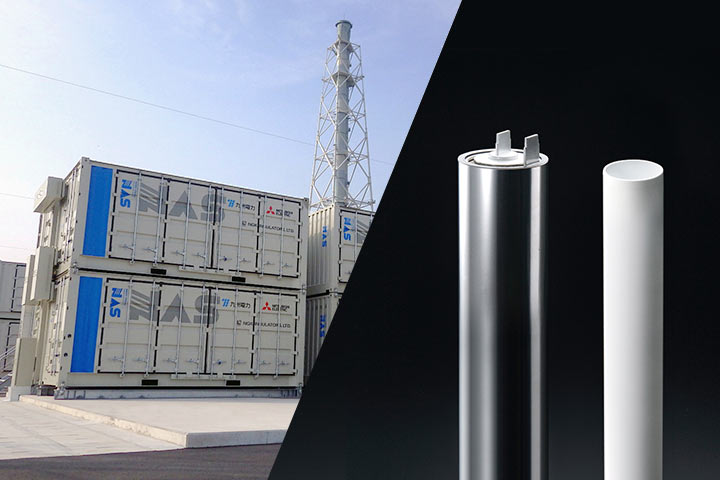
NAS batteries are manufactured by NGK. The batteries feature high capacity, high energy density, long life, and compact dimensions one-third those of lead batteries, enabling stable power supply for extended periods. NAS batteries make it possible to implement peak load shaving and load balancing and help stabilize renewable energy output , thereby contributing to power-saving measures, cutting energy costs, and reducing environmental impact.
NAS batteries have obtained the certification based on UL 1973 standard* (cell and module level) and a test report based on UL 9540A standard* (container type including cells and modules on mounted) .
NAS batteries are rechargeable storage batteries that incorporate anodes (negative electrode) comprised of sodium (Na) and cathodes (positive electrode) comprised of sulfur (S), separated by a fine ceramic solid electrolyte. They can be repeatedly charged and discharged through sulfur-sodium chemical reactions.
NGK has pursued joint research and development with Tokyo Electric Power Company Holdings, Inc., based on the idea of using sodium sulfur batteries to address fluctuating demand for electricity—for example, between the day and night.
* UL 1973 and UL 9540A standard is safety standard for stationary storage batteries issued by UL Solutions, a global independent safety science company.
Operation principle
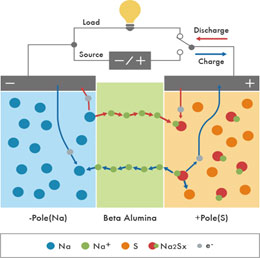
During discharge
- Molten sodium donates electrons to the external circuit at the anode
- The resulting ions Na+ migrate to the cathode through the beta-alumina solid electrolyte that separates the two liquid electrodes and that acts as a superionic conductors
- The volume of liquid at the anode therefore decreases
- Arriving at the cathode, Na+ ions combines with molten sulfur which reacts with the electrons coming from the external circuit, forming sodium polysulfide Na2Sx
- The volume of liquid at the cathode therefore increases
2 Na + x S → Na2Sx with 3.3 ≤ x ≤ 5
During charge
- The reverse process takes place
Battery Cell
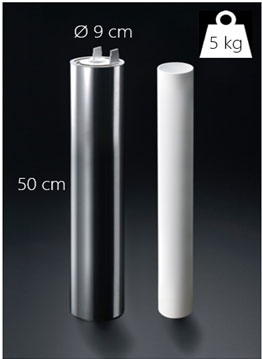
| Voltage | 2V |
| Energy density | 367 Wh/l 222 Wh/kg |
| Power density | 36 W/kg |
| C-rate | 1 / 6 = 0.17 |
| Optimal temperature range | 300 - 340°C |
| Maximal temperature range | 290 - 360°C |
| Life time | 7,300cycles 20 years |
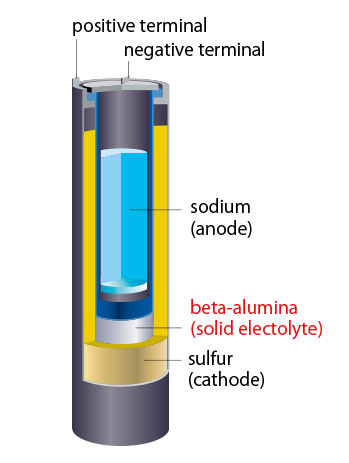
Features of NAS Batteries
NGK's NAS batteries are large-capacity batteries with many power grid applications.
Superior function and performance possible only from decades of research, design, testing, demonstration, advanced manufacturing and over 20 years of proven commercial operation.

Long Duration
NAS batteries are the most effective way to store large amounts of electrical energy discharging for six hours at rated output.
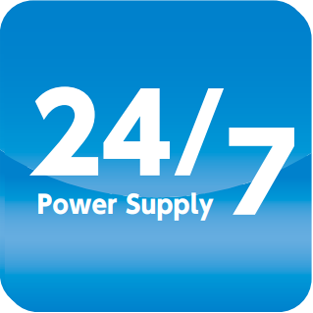
24/7 Power Supply
NAS batteries make 24/7 power supply feasible with solar power for 6-10 hours and a NAS battery for 14-18 hours at one-third of the rated output.

Fast Response
When used with a fastPower Conversion System(PCS), NAS systems can respond to grid commands to store or deliver electrical energy in tens of milliseconds.

Compact
NAS batteries can be flexibly deployed in smaller spaces than other battery technologies.

High Reliability
With decades of experience, NAS batteries have field-proven reliability exceeding 99%.

Safety
The safety of NAS batteries has been proven in testing by NGK and third-party authorities and from extensive field experience.

Developed for Grids
Development of NAS technology by NGK started in 1984 to provide a more flexible energy storage alternative than pumped energy storage, for the world's largest utility, TEPCO. The first NAS battery system deployment was in 1995.

System Expansion
NAS battery systems can be cascaded to any needed size (to 100s of MW or more).

Minimal Maintenance
Preventative maintenance is minimal and can be scheduled to avoid peak seasons. Maintenance can be done on partical systems while the rest of the system continues operation.

Wide Ambient Operating Range
Climates for NAS projects range from the cold of Canadian winters to the heat of Abu Dhabi.

Long Lifetime
(Containerized Type NAS Battery)
NAS batteries are rated as expected lifetime at 7,300 cycles, or a 20 year calendar life, whichever occurs first. *

Plug & Play
Containerized NAS batteries, in which NAS battery modules are pre-installed, drastically reduce installation periods.
Although the expected lifetime for Containerized Type NAS Battery is defined as "20 years or 7,300 cycles, whichever comes first (one cycle is one full charge and discharge cycle)", we offer "15 years or 4,500 cycles, whichever comes first" in Japan based on the regulations in Japan. NGK is working towards applying the above expected lifetime in Japan as well, and we will announce on our website when we are ready to apply it.
Major Advantages of NAS over other battery technologies
Long duration
NAS battery is a large-capacity, long-duration storage battery suitable for daily load leveling and time shifting of wind and solar generation.
Long life expectancy
NAS battery has a calendar life of 20 years and a full charge/discharge durability of 7,300 cycles.Since the active materials of the NAS battery are in molten states, there are no transition between solid and liquid due to charge and discharge, and there is no side reaction, so long life can be expected.
Tolerance for cold and high temperature environment
NAS battery, which operates at 300-340 degree C. in a thermal enclosure, satisfies optimal operating conditions without air conditioning in cold and hot areas.
Safety
The safety of batteries is attracting attention. NAS batteries have been designed with safety as a top priority and have been improved and assured by field experience.
Learn more- *NAS and the NAS logo are trademarks of NGK INSULATORS, LTD., registered in the U.S. and other countries.
Inquiry and/or Catalog Download
Please fill in this form to get in touch with us.
